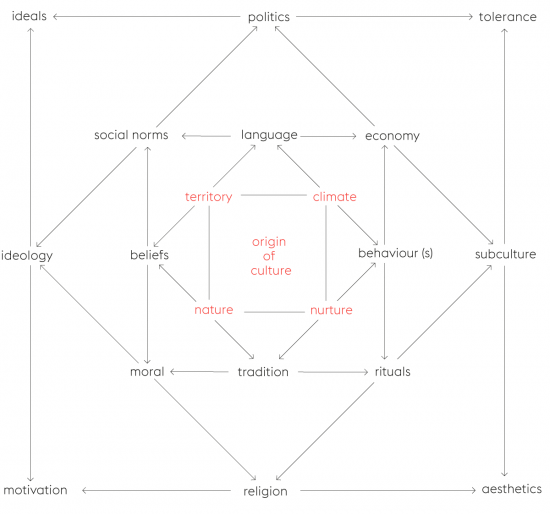CULTURE: in search of the real origin of the word
06.03.2014
The word Culture comes from the Latin colere (to live, grow, honour) and it refers to human activity; more precisely, the activity common to a given group of people.
In Latin, cultura, from colere, means primarily the action of cultivating the land, and by extension the mind and soul. Cicero was the first to apply the term cultura to humans: “A fertile field cannot be productive without cultivation, and it is the same for humans without education.” (Tusculanes, II, 13).

Origin of culture – Connections between the different elements that define culture.
Culture is the result of a set of original features that persist over time and generations. It is the result of human adaptation to and interaction with a multiplicity of variables pertaining to territory, climate, historical influences and the consequent social and political developments. Culture acts upon our emotional states. This is because it constitutes our DNA, over and above our biological heritage, and structures behavior, beliefs and their underlying motivations. Ultimately, culture defines the true essence of what will be transmitted to both our children and distant generations.
Culture cannot be only a practice, because it is a way of being in and through the world. One cannot build culture from scratch because it is the material out of which social life is made. However, one can destroy culture by modifying people’s habits for commercial or ideological purposes. Culture is the relation between human beings and their environment. Time is the filter that makes possible the sublimation of each layer of evolution.
Culture is by definition ethical: it is not based on individual or small group interests but works towards the common good. As such it is anchored in deep-seated values linked to tradition. However, “tradition” should not be seen as monolithic and immutable. It changes and evolves over time within each culture’s framework of meaning, but also as the local and the global interact across space and time. These intersections are characterized by “frictions” – frictions between local ways of doing and global forces. To understand these, we need to carefully analyze each point of contact to understand the multiple elements that constitute it.
Current business understandings of culture are therefore limited. They reify culture by seeing it as a form of “collective programming of the mind” that determines human action (G. Hofstede, Culture’s Consequences, 1980). Accordingly, they analyze culture in terms of psychologically defined sets of behaviors that can be easily identified and summarily applied. Such a vision of culture is reductive. It fails to take into consideration how cultures change over time through the subtle interplay of human adaptation to and interaction with the changing forces that go to make up each group’s existence in and through the world.